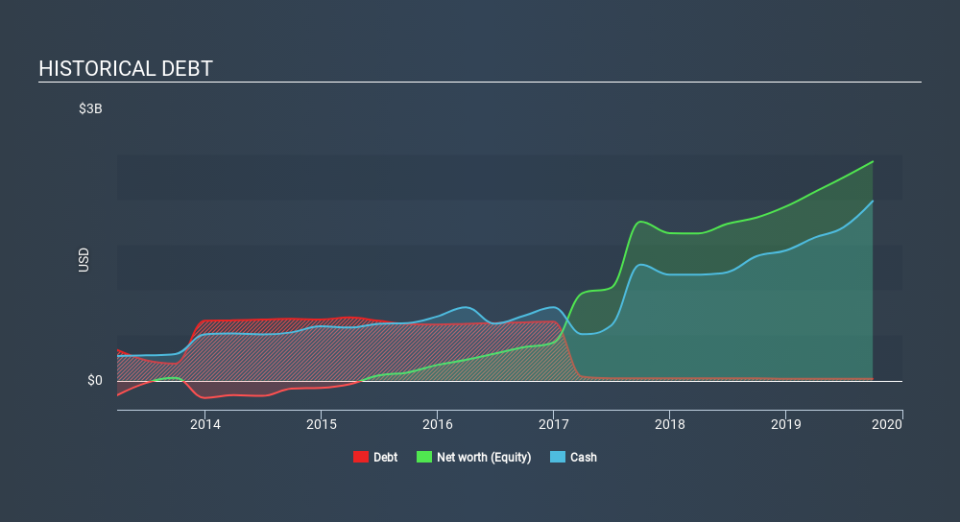Incyte (NASDAQ:INCY) Has A Rock Solid Balance Sheet

Warren Buffett famously said, 'Volatility is far from synonymous with risk.' It's only natural to consider a company's balance sheet when you examine how risky it is, since debt is often involved when a business collapses. As with many other companies Incyte Corporation (NASDAQ:INCY) makes use of debt. But the more important question is: how much risk is that debt creating?
What Risk Does Debt Bring?
Debt and other liabilities become risky for a business when it cannot easily fulfill those obligations, either with free cash flow or by raising capital at an attractive price. Part and parcel of capitalism is the process of 'creative destruction' where failed businesses are mercilessly liquidated by their bankers. While that is not too common, we often do see indebted companies permanently diluting shareholders because lenders force them to raise capital at a distressed price. By replacing dilution, though, debt can be an extremely good tool for businesses that need capital to invest in growth at high rates of return. When we think about a company's use of debt, we first look at cash and debt together.
See our latest analysis for Incyte
What Is Incyte's Net Debt?
You can click the graphic below for the historical numbers, but it shows that Incyte had US$18.1m of debt in September 2019, down from US$24.9m, one year before. But on the other hand it also has US$1.99b in cash, leading to a US$1.97b net cash position.
How Healthy Is Incyte's Balance Sheet?
The latest balance sheet data shows that Incyte had liabilities of US$461.7m due within a year, and liabilities of US$330.6m falling due after that. Offsetting this, it had US$1.99b in cash and US$276.1m in receivables that were due within 12 months. So it can boast US$1.47b more liquid assets than total liabilities.
This short term liquidity is a sign that Incyte could probably pay off its debt with ease, as its balance sheet is far from stretched. Succinctly put, Incyte boasts net cash, so it's fair to say it does not have a heavy debt load!
It was also good to see that despite losing money on the EBIT line last year, Incyte turned things around in the last 12 months, delivering and EBIT of US$412m. There's no doubt that we learn most about debt from the balance sheet. But ultimately the future profitability of the business will decide if Incyte can strengthen its balance sheet over time. So if you're focused on the future you can check out this free report showing analyst profit forecasts.
Finally, a business needs free cash flow to pay off debt; accounting profits just don't cut it. Incyte may have net cash on the balance sheet, but it is still interesting to look at how well the business converts its earnings before interest and tax (EBIT) to free cash flow, because that will influence both its need for, and its capacity to manage debt. Happily for any shareholders, Incyte actually produced more free cash flow than EBIT over the last year. That sort of strong cash conversion gets us as excited as the crowd when the beat drops at a Daft Punk concert.
Summing up
While we empathize with investors who find debt concerning, you should keep in mind that Incyte has net cash of US$1.97b, as well as more liquid assets than liabilities. And it impressed us with free cash flow of US$589m, being 143% of its EBIT. So is Incyte's debt a risk? It doesn't seem so to us. When analysing debt levels, the balance sheet is the obvious place to start. But ultimately, every company can contain risks that exist outside of the balance sheet. For example, we've discovered 1 warning sign for Incyte that you should be aware of before investing here.
If you're interested in investing in businesses that can grow profits without the burden of debt, then check out this free list of growing businesses that have net cash on the balance sheet.
If you spot an error that warrants correction, please contact the editor at editorial-team@simplywallst.com. This article by Simply Wall St is general in nature. It does not constitute a recommendation to buy or sell any stock, and does not take account of your objectives, or your financial situation. Simply Wall St has no position in the stocks mentioned.
We aim to bring you long-term focused research analysis driven by fundamental data. Note that our analysis may not factor in the latest price-sensitive company announcements or qualitative material. Thank you for reading.

